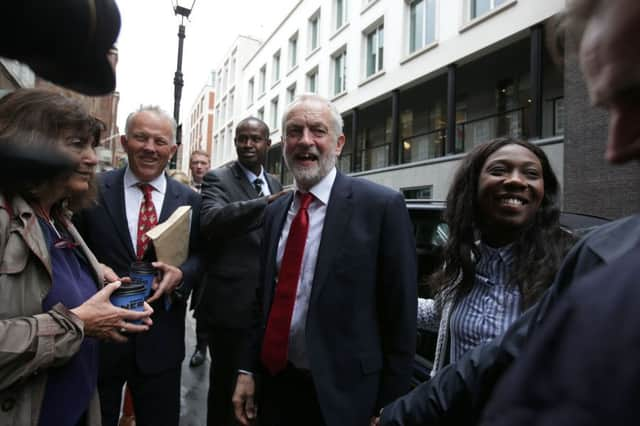Corbyn sows confusion on Labour's commitment to Trident


Confronting accusations that a Labour victory would put national security at risk, Mr Corbyn said he would “do everything necessary” to protect the UK’s security in a major address on foreign policy.
But he sowed confusion over the future of the UK’s nuclear deterrent by suggesting it would form part of strategic defence review (SDR) under a Labour government.
Advertisement
Hide AdAdvertisement
Hide AdA senior party source was forced to clarify Mr Corbyn’s remarks and reiterate that Labour policy was to renew the four missile submarines that carry Trident nuclear weapons, as voted by MPs last year.
Speaking at the foreign policy think tank Chatham House, Mr Corbyn set out his plans for an “ethical” foreign policy modelled on the late Robin Cook’s approach before his resignation over the Iraq war.
Mr Corbyn attacked Theresa May’s bid to strengthen ties with the United States, saying there would be “no more hand-holding” with President Trump if he was in Downing Street.
He said: “I am not a pacifist. I accept that military action, under international law and as a genuine last resort, is in some circumstances necessary. But that is very far from the kind of unilateral wars and interventions that have almost become routine in recent times.”
He signalled that British troops would only be sent on UN-approved peacekeeping missions, and said deployments to East Timor and the Mediterranean during the migrant crisis were the only postwar interventions he would have ordered as Prime Minister.
On nuclear weapons, Mr Corbyn said: “I am often asked if as prime minister I would order the use of nuclear weapons. It’s an extraordinary question when you think about it - would you order the indiscriminate killing of millions of people? Would you risk such extensive contamination of the planet that no life could exist across large parts of the world?
“If circumstances arose where that was a real option, it would represent complete and cataclysmic failure. It would mean world leaders had already triggered a spiral of catastrophe for humankind.”
Labour’s shadow defence secretary Nia Griffith, who has clashed with Mr Corbyn over Trident, was not present to hear the speech, but the shadow foreign secretary Emily Thornberry, a close Corbyn ally, was in the audience.
Advertisement
Hide AdAdvertisement
Hide AdMr Corbyn said Labour was committed to nuclear disarmament and was opposed to a first-strike policy on the use of nuclear weapons. Asked whether he backs a like-for-like replacement of the four Trident submarines, he replied: “The decision of Parliament was to endorse the Government’s proposal for the replacement of Trident, that is the decision we will inherit as a Labour government and that is what the position is.
“We will also undertake a strategic defence review as all incoming governments do, looking at all aspects of our defence priorities for the future. But we cannot obviously decide what the review would decide, otherwise we wouldn’t have a review.”
A senior party source later clarified that Trident would form part of the SDR and that the policy “going into the review” would be to back renewal. He later clarified: “Trident is part of the SDR but its renewal is not in question.”
Mr Corbyn also revealed that one of his first foreign policy decisions could be to pull the RAF out of the international operation against the so-called Islamic State.
British involvement in air strikes on Islamist militants in Syria and Iraq would be reviewed “straight away”, he said. Mr Corbyn insisted he would not hold talks with the Islamic State, and would instead push for a peaceful political solution to the Syrian civil war through ongoing talks in Geneva.
Foreign Secretary Boris Johnson said he was “genuinely alarmed” by Mr Corbyn’s comments.
“I think what Jeremy Corbyn is showing is the continuing immature, anti-Americanism of many of his strain in the Labour Party.
“If Jeremy Corbyn thinks the way to maximise UK influence is to go around weakening the alliance between the UK and Washington then he is deluded.”
Advertisement
Hide AdAdvertisement
Hide AdMr Johnson added: “This is a guy who thinks we should get rid of our armed forces, like Costa Rica. He thinks Nato is nonsense.”
Speaking on the campaign trail in Inverness, Nicola Sturgeon said: “I think Jeremy Corbyn should have the courage of his convictions on nuclear weapons.
“I want to see Trident scrapped not renewed, so we can have investment in our conventional forces.”